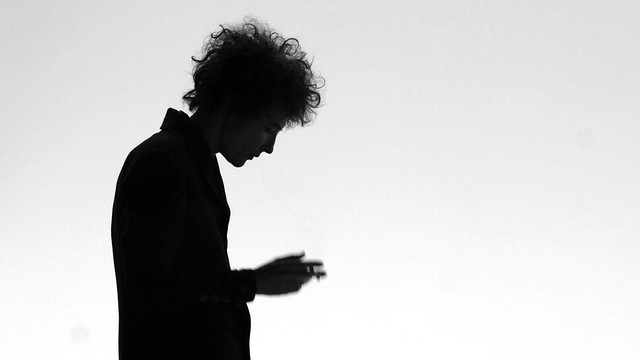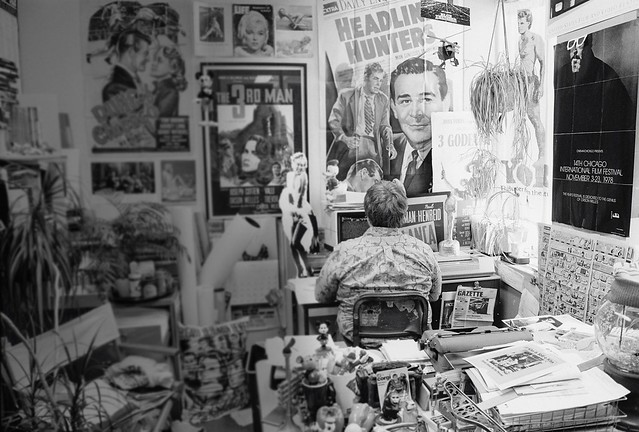Say what you will about Natalie Portman's performance (which I personally adore) but there is no way to deny that this film is a subjective masterpiece. It literally puts you in the high-heeled shoes of Jackie Kennedy. Pablo Larrain and his collaborators make you realize that though she came from money and became First Lady, as a woman, a wife, and a public figure, Jackie had almost no agency. Everyone has an opinion on what she should should do or say. Every action is second guessed. And then her husband's head blows up. Suddenly, all bets are off. In the chaotic days after JFK's assassination, Jackie sees a chance to take control for once and she seizes it with both hands. She is a woman liberated and that is a beautiful thing to behold.
Showing posts with label biopic. Show all posts
Showing posts with label biopic. Show all posts
Thursday, March 30, 2017
Thursday, November 3, 2016
I'm Not There. (2007)
This film is a real Catch-22 because the only way to tell the story of a chameleon like Bob Dylan is to have the film change along with him...creating a fragmented experience that never really comes together as a cohesive whole. It's like a really great album with a few bum songs thrown in to knock you off balance. And I'm sure that really pleased Dylan. This is the man who willfully alienated most of his audience by going electric and by becoming Born Again. While some of the metaphors, allusions and homages help to bring us deeper into Dylan's mind, others only serve to alienate us further. The result is a film that's nearly as enigmatic as its subject. It will never be a perfect film, but it is absolutely perfect in its imperfection.
Thursday, June 30, 2016
Life Itself (2014)
If you know me at all you know that I'm extremely hard on documentaries. Paint by numbers does not work for me. Bio docs are often the worst offenders. If I wanted a list of incidents I would just read the person's Wikipedia page. While Life Itself certainly does make a point of checking off all the key moments in Roger Ebert's life, it stands out by choosing to mirror the structure of the biography on which it was based.
Rather than telling a strict chronological narrative, Ebert's book is structured much more like a series of essays where each covers a different aspect of his life. There's the one about journalism, the one about alcoholism, the one about Scorsese, the one about Chaz, etc. Instead of a simple list of accomplishments, you get to take in all the numerous and diverse aspects of Roger's life. He wasn't just a film critic. He wasn't just a recovering alcoholic. He wasn't just a TV personality. He was all those things and many more. This is a film about all the different elements that make up a person. This is a film about Life Itself.
Labels:
biopic,
craig,
documentary
Monday, October 5, 2015
Behind the Candelabra (2013)
As much as I enjoyed this film when it premiered on HBO, I nearly went insane trying to figure out what had drawn Steven Soderbergh to this material. By all accounts he'd been planning this one since at least the late 90's when he floated the idea to Michael Douglas on set while they were making Traffic. What was it that kept such a simple story (that we all know the beats to) in his head for so long? While only Soderbergh can say for certain, I think I finally figured it out.
From the first actual Liberace scene it hit me. He's up there on stage doing this very simple boogie-woogie number that I'm certain even I could learn...and then he starts upping the tempo. He starts augmenting it with all these little flourishes. In the next scene he tells a story about playing piano in a saloon back in Milwaukee where the audience asks him to play a hit parade song called "Three Little Fishes". Well rather than simply playing the song everyone knew by heart and in the style to which they were accustomed, Liberace opted to do it in the style of Strauss.
And that is what I think drew Soderbergh to this project: The chance to take a story that is the cinematic equivalent of a "standard" and to drench it in gaudy style for style's sake. Why is the camera placed in a certain spot? Because it makes the scene more interesting to look at! Everything is in the interest of giving the audience a good time. And it works! There is no deeper meaning. It's a celebration of surface that I'm sure even Liberace himself would have really admired.
Thursday, August 8, 2013
The Aviator (2004)
A bio-pic portraying the early years of filmmaker and pilot Howard Hughes (Leonardo DiCaprio) who made the most expensive movies and flew the fastest planes.
* * *
Aside from his attempt at a musical with New York, New York, all of Martin Scorsese’s films prior to 2002 had all been decidedly small and low-fi. Even his “Biblical Epic” The Last Temptation Of Christ was rendered intimate and small. No elaborate sets or sweeping crane shots here folks. And he made Gangs Of New York. Shot on the Fellini stages at Cinecittà, no expense was spared. Finally Scorsese was able to live out his dream of being a classical Hollywood director like the ones he grew up admiring.
As much as I enjoy aspects of that film, it doesn’t quite work for me as a whole. Anchored by strong performances (especially that of Daniel Day-Lewis as Bill The Butcher) it feels less like a film and more like an opportunity for Scorsese to show off how much research he had accumulated in the 25 years the film had been in development. Having all that research in the background of your story is fine, it helps to make things more real, but placing it before your narrative becomes tiresome. Though I was bummed about him losing the Best Director Oscar that year, I have to admit I was kind of OK with it.
When The Aviator was announced as his follow up film I was quietly dreading more of the same. Once again he would be working on an epic canvas with apparently unlimited resources. I was worried that Howard Hughes would become nothing more than a means by which to express all of the Hollywood history Marty had been voraciously consuming since childhood. I was prepared for another well-shot yet meticulous history lesson. Thank God I was wrong.
Now of course I’m not saying that this film is an intimate affair in any sense of the word (the sets are huge and the flying/crashing scenes are rivetingly intense) but foregrounding all of this spectacle is an extremely strong script by John Logan and most importantly a fascinating character, exquisitely portrayed by Leonardo DiCaprio. More so than the parties and the planes and the women, this is a story about a man who despite all his wealth, power and cunning, could not escape his own mind. He can find ways to make it work for a time. He can even overcome the occasional breakdown. But in the end, the inevitable is always nipping at his heels and ready to overtake him. Ready to overtake him. Ready to overtake him. Ready to overtake him…
Labels:
biopic,
craig,
drama,
epic,
historical
Monday, May 7, 2012
Kinsey (2004)
A biopic on the infamous Dr. Alfred Kinsey (Liam Neeson) whose research on human sexuality brought about a firestorm of controversy in post-war America.
* * *
It's sad how fast this film was forgotten, even in the year of it's release. The only Oscar it was up for was Best Supporting Actress. It's the middle-child of Bill Condon's filmography, sandwiched between the much better received Gods and Monsters and Dreamgirls. Yet of those three, Kinsey is easily the more important film. Were it to be released today amidst the waves of gay teen suicides and Rick Santorum's war on reproductive freedom, it would likely provoke a firestorm. Well like mama always said: It's never too late to start a revolution! If you haven't seen this film yet, see it. If you have seen it, show it to a friend. Show it to multiple friends! Let the good word spread like VD!
Wednesday, July 20, 2011
Milk (2008)
A touching bio-pic about the all too short political life of Harvey Milk (Sean Penn) the first openly gay elected official in America.
* * *
For over a decade Gus Van Sant had been attached as director to a bio-pic on Harvey Milk. So what was holding him up? Oh just the long shadow of a little Oscar-winning documentary called The Times of Harvey Milk. How do you make your film anything more than actors re-staging the legendary moments that were already so vividly captured in the documentary? By showing us the moments when there were no cameras.
I don't care who you are: when a camera is on you, you're never your real self. Sure the re-staged rallies and marches are amazing (Gus had lots of practice re-staging iconic moments from his Psycho remake) but it's the small moments that really sell this film. Scenes of Harvey and his boyfriend Scott and scenes of back-room political deal making, this is where we really get to see Harvey. Van Sant and Penn are able to take us inside these private moments. They are even able to take us into Harvey's most private moment - his death.
Subscribe to:
Posts (Atom)




